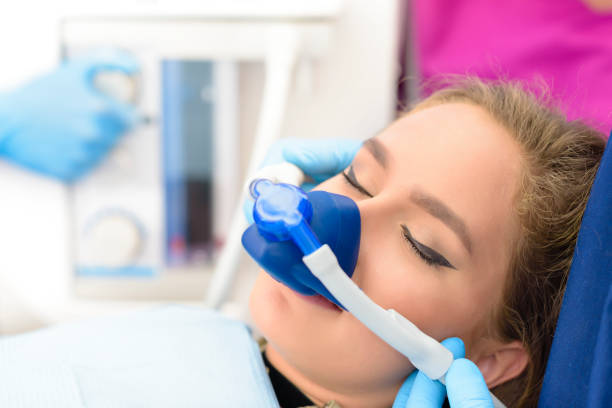Oral Surgery Post-Operative Instructions:
FIRST HOUR: Bite down on the moist gauze packs that have been placed over the surgical areas, making sure they remain in place. Take out the gauze after 60 minutes. If still bleeding, replace with new moist gauze for another 60 minutes. Do this until the bleeding is controlled. The gauze may be changed as necessary.
NO SMOKING! NO SMOKING! Do NOT smoke, drink through a straw, or spit too hard for 10 days following procedure since it is very detrimental to healing and can cause dry socket!
BLEEDING: Bleeding is normal for approximately 24 hours after surgery. Minor bleeding or blood-tinged saliva may occur for the first 24 to 48 hours. Bite on gauze for 2 to 3 hours following surgery. If heavy bleeding still occurs, either replace with a moist tea bag (soaked in hot water, squeezed damp-dry and wrapped in moist gauze) and bite for an additional 1 to 2 hours.
RINSING: You may drink liquids, however DO NOT vigorously rinse your mouth for the first 24 hours following surgery. After 24 hours, gently rinse your mouth with warm salt water (1 teaspoon of salt in an 8oz glass of lukewarm water) 3 or 4 times daily for the next 5 days. Depending on your surgery, you might have been prescribed a medicated oral rinse, follow the instructions on the bottle if you were given such prescription.
SWELLING: Swelling is the body’s normal response to surgery and the beginning of the healing process. It varies among individuals and according to different procedures. Swelling will increase over the first 3 days and can continue up to day 7. Typically, pain is the worse on the 3rd and 4th day. Apply cold packs (15 minutes on, 15 minutes off) for the first 36 hours after surgery while awake. You can apply moist heat compresses on the fifth day. Keep your head elevated for the first 3 days using pillows under the back and head while sleeping.
PAIN: Unfortunately, most oral maxillofacial surgery is accompanied by some degree of discomfort. Medication has been prescribed according to your anticipated level of discomfort. Your surgery doctor will give you medication that is to be utilized for 5-6 days. This medication can be alternated every 4 hours as informed by Dental Assistant at time of discharge. Take the medication with a milk shake or soft food to avoid nausea. Do not drive, operate hazardous machinery or drink alcohol while taking pain medication.
NAUSEA: Nausea is not an uncommon event after surgery, and it is sometimes caused by pain medication. Nausea may be reduced by preceding each pill with a small amount of soft food, then taking the pill with a larger volume of water. Try to keep taking clear fluids and minimize the pain medication, call if you do not feel better or if repeated vomiting is a problem.
SUTURES: If sutures were placed, they will dissolve between 4 to 10 days on their own unless you were told that non-dissolving sutures were used. Sutures may loosen of come out prior to your next appointment and we advise you to never tug on the suture that has come loose. You may snip off the excess suture if it bothers you.
DIET: Eat any nourishing food that can be taken with comfort. AVOID EXTREMELY HOT FOODS. Also do not eat spicy foods. It is sometimes advisable to confine the first day’s intake to blank liquids and pureed foods (ice cream, creamed soups, pudding, yogurt, milk shakes, etc.) Avoid foods like nuts, sunflower seeds, popcorn, etc. or adding pepper to your food. Foods that typically do not easily dissolve on their own will get lodged in the socket areas. You may switch to solid foods at your own pace. It is important to NOT SKIP MEALS! Nutritional shakes you can purchase such as Ensure are a great supplement to help keep you nourished. If you take nourishment regularly, you will feel better, gain strength, and heal faster. If you’re diabetic, maintain your normal eating habits as much as possible and follow instruction from us or your physician regarding your insulin schedule.
SHARP EDGES: If you feel sharp edges in the surgical areas with your tongue, it is probably the bony walls which originally support the teeth. Occasionally the small pieces of bone may work themselves out during the first week or two after surgery. They are not pieces of the tooth and if necessary, we will remove them typically after 90 days if they do not fall off on their own. If a denture is placed in mouth after surgery, DO NOT REMOVE IT! Do not remove the denture until the following day (or the next time our office is open) when you come in for a post-operative checkup and denture adjustment.
BRUSHING: You may gently brush your teeth the day after surgery, being careful in the area where surgery was performed. Please make every effort to clean your teeth within the bounds of comfort. Warm salt water is the best way to keep your mouth clean. Try to avoid using strong products such as Listerine during your healing time. Use a soft bristle toothbrush. Keeping your mouth clean and avoiding alcohol, smoking, or sucking/smacking motions are key to a successful healing experience.
Be assured that our interest in your well-being does not end with your surgery. It is our desire that your recovery be as smooth and pleasant as possible. Following these instructions will assist you, but if you have questions about your progress, please call out office where you had surgery.

